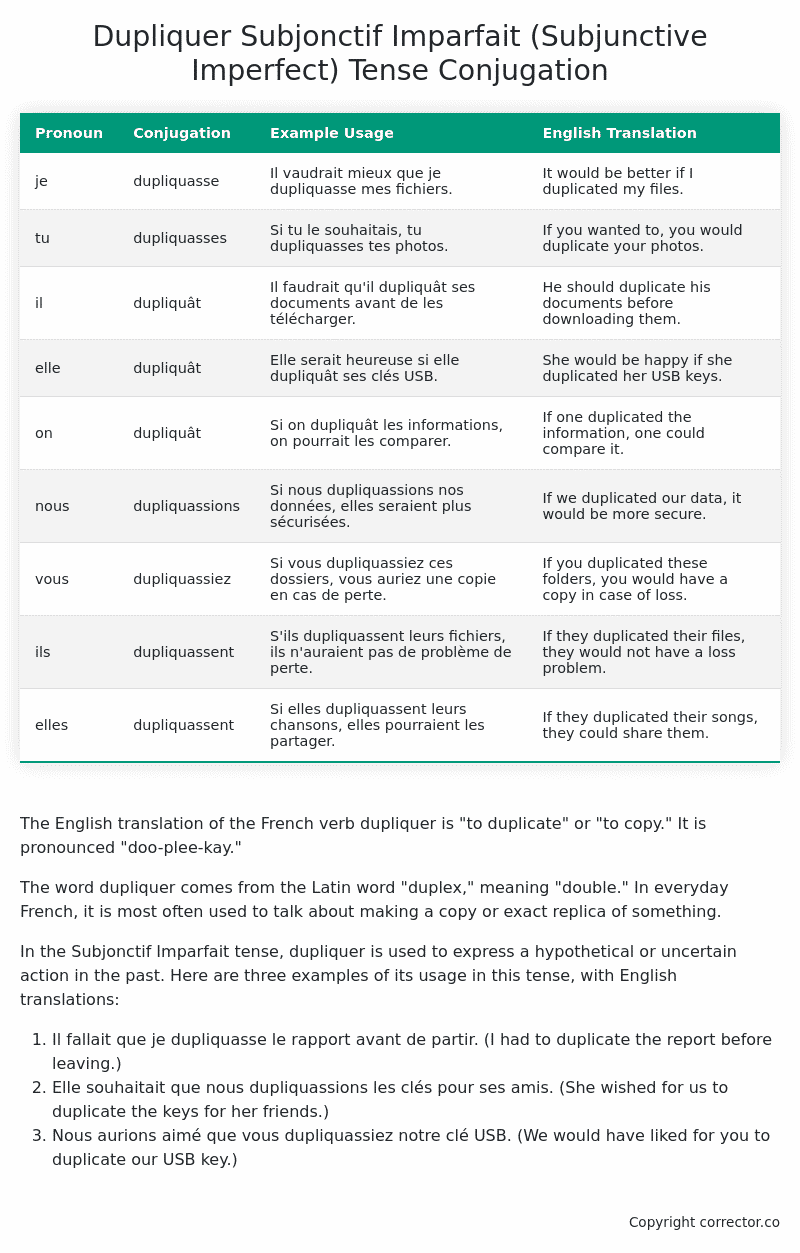Subjonctif Imparfait (Subjunctive Imperfect) Tense Conjugation of the French Verb dupliquer
Introduction to the verb dupliquer
The English translation of the French verb dupliquer is “to duplicate” or “to copy.” It is pronounced “doo-plee-kay.”
The word dupliquer comes from the Latin word “duplex,” meaning “double.” In everyday French, it is most often used to talk about making a copy or exact replica of something.
In the Subjonctif Imparfait tense, dupliquer is used to express a hypothetical or uncertain action in the past. Here are three examples of its usage in this tense, with English translations:
- Il fallait que je dupliquasse le rapport avant de partir. (I had to duplicate the report before leaving.)
- Elle souhaitait que nous dupliquassions les clés pour ses amis. (She wished for us to duplicate the keys for her friends.)
- Nous aurions aimé que vous dupliquassiez notre clé USB. (We would have liked for you to duplicate our USB key.)
Table of the Subjonctif Imparfait (Subjunctive Imperfect) Tense Conjugation of dupliquer
| Pronoun | Conjugation | Example Usage | English Translation |
|---|---|---|---|
| je | dupliquasse | Il vaudrait mieux que je dupliquasse mes fichiers. | It would be better if I duplicated my files. |
| tu | dupliquasses | Si tu le souhaitais, tu dupliquasses tes photos. | If you wanted to, you would duplicate your photos. |
| il | dupliquât | Il faudrait qu’il dupliquât ses documents avant de les télécharger. | He should duplicate his documents before downloading them. |
| elle | dupliquât | Elle serait heureuse si elle dupliquât ses clés USB. | She would be happy if she duplicated her USB keys. |
| on | dupliquât | Si on dupliquât les informations, on pourrait les comparer. | If one duplicated the information, one could compare it. |
| nous | dupliquassions | Si nous dupliquassions nos données, elles seraient plus sécurisées. | If we duplicated our data, it would be more secure. |
| vous | dupliquassiez | Si vous dupliquassiez ces dossiers, vous auriez une copie en cas de perte. | If you duplicated these folders, you would have a copy in case of loss. |
| ils | dupliquassent | S’ils dupliquassent leurs fichiers, ils n’auraient pas de problème de perte. | If they duplicated their files, they would not have a loss problem. |
| elles | dupliquassent | Si elles dupliquassent leurs chansons, elles pourraient les partager. | If they duplicated their songs, they could share them. |
Other Conjugations for Dupliquer.
Le Present (Present Tense) Conjugation of the French Verb dupliquer
Imparfait (Imperfect) Tense Conjugation of the French Verb dupliquer
Passé Simple (Simple Past) Tense Conjugation of the French Verb dupliquer
Passé Composé (Present Perfect) Tense Conjugation of the French Verb dupliquer
Futur Simple (Simple Future) Tense Conjugation of the French Verb dupliquer
Futur Proche (Near Future) Tense Conjugation of the French Verb dupliquer
Plus-que-parfait (Pluperfect) Tense Conjugation of the French Verb dupliquer
Passé Antérieur (Past Anterior) Tense Conjugation of the French Verb dupliquer
Futur Antérieur (Future Anterior) Tense Conjugation of the French Verb dupliquer
Subjonctif Présent (Subjunctive Present) Tense Conjugation of the French Verb dupliquer
Subjonctif Passé (Subjunctive Past) Tense Conjugation of the French Verb dupliquer
Subjonctif Imparfait (Subjunctive Imperfect) Tense Conjugation of the French Verb dupliquer (this article)
Subjonctif Plus-que-parfait (Subjunctive Pluperfect) Tense Conjugation of the French Verb dupliquer
Conditionnel Présent (Conditional Present) Tense Conjugation of the French Verb dupliquer
Conditionnel Passé (Conditional Past) Tense Conjugation of the French Verb dupliquer
L’impératif Présent (Imperative Present) Tense Conjugation of the French Verb dupliquer
L’infinitif Présent (Infinitive Present) Tense Conjugation of the French Verb dupliquer
Struggling with French verbs or the language in general? Why not use our free French Grammar Checker – no registration required!
Get a FREE Download Study Sheet of this Conjugation 🔥
Simply right click the image below, click “save image” and get your free reference for the dupliquer Subjonctif Imparfait tense conjugation!

Dupliquer – About the French Subjonctif Imparfait (Subjunctive Imperfect) Tense
Formation
Common Everyday Usage Patterns
Interactions with Other Tenses
Subjonctif Présent
Indicatif Passé Composé
Conditional
Conditional Perfect
Summary
I hope you enjoyed this article on the verb dupliquer. Still in a learning mood? Check out another TOTALLY random French verb conjugation!


